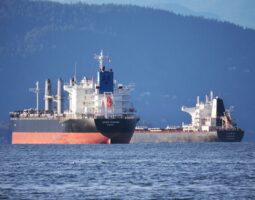USMCA Regulations Released
USMCA Regulations Released
On June 3, 2020, the United States Trade Representative announced the final uniform regulations for United States–Mexico–Canada Agreement (USMCA). These regulations will be used for interpretation, application and administration of Chapter 5 (origin procedures), Chapter 6 (textile & apparel goods), and Chapter 7 (Customs Administration & Trade Facilitation).
United States intends to enter the USMCA into force on July 1, 2020.
Prior to the finalized regulations, CBP released interim instructions for USMCA implementation. Once the USMCA enters into force, each country will apply a “joint review” every 6 years to ensure the agreements remains up to date.

My Product Qualified for NAFTA.
Does that mean it qualifies for USMCA?
No. Organizations should not assume products that received preferential treatment under NAFTA will also be eligible under USMCA. Organizations must reevaluate products based on the revised agreement. Scarbrough can help with that. Email consulting@scarbrough-intl.com.
Can I use my NAFTA Certificate of Origin for USMCA?
The NAFTA certificate of origin is no longer valid after June 30, 2020. An importer must submit required data utilizing the USMCA rules of origin for goods entering the United States as of July 1, 2020.
Is a Certificate of Origin Required for USMCA?
According to CBP’s Guidance, “The U.S. – Mexico – Canada Agreement (USMCA) does not require a specific certificate of origin as does the North American Free Trade Agreement. CBP Form 434 is not mandatory under the USMCA.” However, Scarbrough has created a template to enter all required data to submit to CBP as indicated below. **The following data can be submitted to CBP in any format an organization prefers and does not need to be submitted via the form we created. It is simply a guideline or template. Download USMCA template.
What is required to claim USMCA?
A claim for preferential treatment under the USMCA should contain nine minimum data elements. These data elements are set out in the USMCA’s Annex 5-A (Minimum Data Elements). The data elements must indicate that the good claiming preferential treatment originates and meets the requirements of USMCA Chapter 5. This information may be provided on an invoice or any other document. The information must describe the originating good in sufficient detail to enable its identification and meet the requirements as set out in the Uniform Regulations.
Data Elements Required for USMCA
- Importer, Exporter, or Producer Certificate of Origin
- Certifier
• Name, title, address (including country), phone & email - Exporter
• Name, address (including country), phone & email
• Only provide if different than the Certifier
• Not required if completed by the producer & the exporter is unknown
• Address shall be the place of export of the good in a Party’s territory - Producer
• Name, address (including country), phone & email
• Only provide if different from certifier or exporter
• If multiple producers state “Various” or provide a list
• May maintain confidentiality with “Available upon request by the importing authorities”
• Address shall be the place of production of the good in a Party’s territory - Importer
• Name, address (including country), phone & email
• Address shall be in a Party’s territory - Description & HS Tariff Classification of the Good
• 6-digit level (XXXX.XX)
• Description should be sufficient to relate it to the good covered by certification - Origin Criteria
• Specify the origin criteria set out in Article 4.2 - Blanket Period
• Include the period if the certificate covers multiple shipments - Authorized Signature & Date
• Must be signed and dated by the certifier & must be accompanied by the following statement:
“I certify that the goods described in this document qualify as originating and the information contained in this document are true and accurate. I assume responsibility for proving such representations and agree to maintain and present upon request or to make available during a verification visit, documentation necessary to support this certification.”
Other CBP Links
- The USMCA Implementing Instructions – June 30, 2020
- The USMCA Implementation Act (Public Law No: 116-113)
- The USMCA Agreement, Final Text
- USTR Federal Register Notice on USMCA Alternative Staging Regimes for Automotive Imports – 85 FRN 22238, April 21, 2020
- USMCA Post-Importation Claims and MPF Processing
Free Online Training
Join us with North American trade experts to learn about the highlights of the newly revised agreement between United States, Mexico, and Canada (USMCA) which will go into force on July 1, 2020. Can’t make it to the training? Sign up anyway and receive the recording.
Training on USMCA includes:
• Overview of USMCA
• USMCA changes from NAFTA
• De Minimis Changes
• Transhipment requirements
• SPI Change
• MPF exemption
• Certificate of Origin (Do’s & Dont’s)
• Record Keeping
Intellectual Panel Discussion with the experts on USMCA, includes:
• NAFTA and USMCA: Not the same thing
• USMCA: What’s the good news?
• Certificate of Origin: Where did the form go?
• Record Keeping requirements: Are you ready?
• Should I move to near-shoring?
USMCA Consulting Request
Need help with USMCA requirements now? Email consulting@scarbrough-intl.com for a free 30- minute consultation or fill out the form below.
About Scarbrough
Scarbrough Global of Companies, headquartered in Kansas City with local presence in every major port in the world, is a complete international and domestic supply chain service provider, offering U.S., Mexican, and Canadian Customs brokerage, Import & Export Transportation Solutions, Domestic brokerage and asset-based trucking, Warehouse fulfillment and distribution services, Trade Compliance Consulting, Large Equipment and Project Cargo moves, as well as Parcel Audit Savings. Scarbrough is widely known for its trade experts, training, personalized customer service, and customized solutions. Since 1984, Scarbrough has continued to satisfy its clients by following its motto on a daily basis: “It is our job to make your job easier.” Moreover, our team of experts is available at your disposal. We offer free consultations on any topic from supply chain optimization and duty savings opportunities to the basics, helping to guide new importers and exporters as they jump into the world of global trade. Contact us now.

